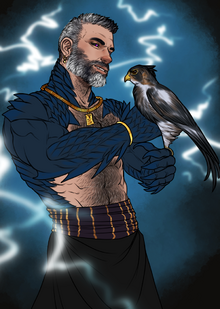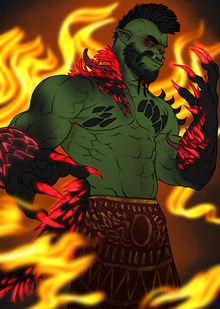More actions
No edit summary |
No edit summary |
||
| Line 54: | Line 54: | ||
[[File:Dreamdragon.png|220px|caption|left]] | [[File:Dreamdragon.png|220px|caption|left]] | ||
| | | | ||
* '''Name:''' Daiana ( | * '''Name:''' Daiana (Da'amu in), Dragon of the Elements and Planet. | ||
* '''Domain:''' | * '''Domain:''' Daiana's domain is the planet itself, she is the world. | ||
* '''Symbols:''' Earth, Ancestor Spirits, Nature, Dreaming, Child-bearing. | * '''Symbols:''' Earth, Ancestor Spirits, Nature, Dreaming, Child-bearing. | ||
* '''Role:''' Daiana | * '''Role:''' Daiana is the rock upon which all living move through space. | ||
* '''Traits:''' Shamanism, Maternal, Nurturing, Meditation, Grounding, Wisdom. | * '''Traits:''' Shamanism, Maternal, Nurturing, Meditation, Grounding, Wisdom. | ||
* '''Temple:''' Great Hall of Mother in Kezzeret Kashubasha (Eronidas State). | * '''Temple:''' Great Hall of Mother in Kezzeret Kashubasha (Eronidas State). | ||
* '''Allies:''' Mana faithful | * '''Allies:''' Mana faithful, Mothers, Yanar, Narim, Dwarves, Elkonur faithful, Spirits. | ||
* '''Enemies:''' | * '''Enemies:''' | ||
* '''Rituals:''' Daiana is celebrated through the Harvest Ritual and Caring Ceremony, the former which involves celebrating harvest and sharing meals with others, the latter which involves bestowing both the blessing and responsibility of caring onto someone else by granting them a plant, a pet, or a child to take care of. Daiana is also invoked by priests to summon the Spirits or appearances of dead relatives to give consolation to the mourning living. | * '''Rituals:''' Daiana is celebrated through the Harvest Ritual and Caring Ceremony, the former which involves celebrating harvest and sharing meals with others, the latter which involves bestowing both the blessing and responsibility of caring onto someone else by granting them a plant, a pet, or a child to take care of. Daiana is also invoked by priests to summon the Spirits or appearances of dead relatives to give consolation to the mourning living. | ||
|} | |} | ||
| Line 179: | Line 179: | ||
==Magic Policy== | ==Magic Policy== | ||
Magic, or more specifically how to treat Magic (that is not Dragon Magic), varies for each of the Dragons, and subsequently as their faithful as they are bound to choose one of the Dragons as their Patron. The Dragon policies are called "The Radicals" for example the Radical of Destruction or the Radical of Apathy. Each Dragon has a context and nuance for why they feel that particular way, which is explained below. It is possible to apply multiple Radicals at once. | Magic, or more specifically how to treat Magic (that is not Dragon Magic), varies for each of the Dragons, and subsequently as their faithful as they are bound to choose one of the Dragons as their Patron. The Dragon policies are called "The Radicals" for example the Radical of Destruction or the Radical of Apathy. Each Dragon has a context and nuance for why they feel that particular way, which is explained below. It is possible to apply multiple Radicals at once. | ||
* '''Regulus, the Radical of Symbiosis:''' Regulus was born and lived most of his life as a mortal Ailor, and spent many years warming up to the presence of Occult. Notable in his history, is his intense friendship with a Pride Arkenborn, who softened him to the value of the Occult to fight an indeterminate "evil". As such, Regulus's Radical is that of Symbiosis, the idea that the Occult can also be recruited in the fight against the bad types of Magic, or the bad types of Magic users. Regulus fervently believes in the right of the Occult to live their life un-harassed by demands to convert to Dragon Magic or be rid of their Magic, as well as free from the fear of being killed for being Occult, but only for a narrow band of Occult who agree that casual, indifferent, or whimsical use of Magic is extremely dangerous. Regulus seeks to recruit Occult of Void, Exist, or Ordial alignment, who will aid in the fight against the Death Cults, Evolist Gods, Undead, Arken, and their ilk. Finally, Regulus and his followers determine those who are irredeemably "evil" for their vile Magic usage, declaring them Anathema and handing the matter off to Caius and his faithful for the hunt. | |||
* '''Caius, the Radical of Fire:''' Caius has suffered for 80,000 years, as the Void itself is tearing him apart. When the Void opened, Dragons being curious, sent Caius in to try and understand what it was. This event caused Caius's soul and body to split in two (the other half being Ifrit). He has been infected with a slow rotting corruption from within that will eventually overtake him, and so the urgency of his fight against the Occult is a desperation to end the infection before it ends him. His Radical of Fire, insists that the bad type of infection (Magic, Afflicted) must be burned out with fire and sword without mercy. Umbra believes that Caius's condition is made worse by casual Magic usage (such as just doing magic for the sake of it, or to impress others without urgent need), and so while Caius does not demand all Magical people be exterminated for being Magical, he demands they be made to suffer for casual Magic and abuse of Magic for selfish reasons with fire so they learn not to add to the suffering of Caius. Caius and his followers also wait for Regulus to determine who is Anathema in the law of Draconism, and seek out to utterly destroy those that have been labeled irredeemable to help Caius in his suffering. | |||
* '''Daiana, the Radical of Peace:''' | |||
* '''Triton, the Radical of Power:''' | |||
* '''Nox, the Radical of Illusion:''' | |||
* '''Marik, the Radical of Illumination:''' | |||
* '''Umbra, the Radical of Demise:''' | |||
* '''Felicula, the Radical of Love:''' | |||
* '''Severena, the Radical of Inward:''' | |||
* '''Aurora, the Radical of Focus:''' | |||
==Priestly Activities== | ==Priestly Activities== | ||
To be Expanded. | To be Expanded. | ||
Revision as of 02:16, 11 December 2023
| Draconism | |
|---|---|
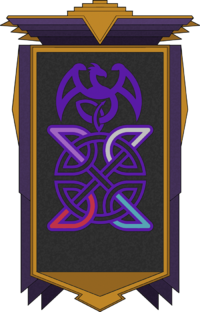 | |
| Religion | |
| Pronunciation | Dra-konism |
| Origins | Unknown, presumed over 70.000 years ago |
| Deities | |
| Regulus, Caius, Daiana, Triton, Nox, Marik, Severena, Aurora. | |
Origins
Draconism is the oldest Religion in the world, presumed to have existed in some form or another for nearly 100,000 years, though it is at the very least certain that the dogma has changed over successive generations. For example, the Maraya who have awoken from the Vaults, find Draconism radically different from what they remember in their Civilization, and even different from the archeological studies they did of the third Civilization that preceded them. Draconism styles itself after the values and principles of the Dragons in that Era, themed or styled in itself after the Races that roam the world at that time. It is as such an ever changing Religion that shapes itself based on the followers, though the Dragon Gods are eternal and remain largely similar with only their Race and some subtext changing between successive generations. Draconism has followers all over the world, but is generally speaking one of the weaker religions, being outclassed in number of followers by the likes of Unionism, Estelley, Fornoss, and some would argue even Evolism. Draconism has technically been a dead religion for 300 years, as the Dragons disappeared from the world in various ways, leaving behind their faithful who now worshiped in essence dead Gods. In the last few years however, Draconism has made a quick revival with many Temples being inhabited again, and the Dragons coming back alive in what is referred to as the Revival of Immortality.
History
To understand why the Dragons "died", it is necessary to understand the grand theme running through Draconism, being The Immortal War. The Immortal War refers to the endless conflict between the Dragons and what they call The Infection, which means Ordial/Exist/Void Essences that creep into the world of Aloria and attach to living and non living things there. The Dragons see themselves as natural wardens of the order of the world, and seek to remove The Infection from the world as a result. The Immortal War is mostly fought between Dragons and the Arken, at least historically speaking when they were still bound to Estel and Behesael. Each successive Void Invasion signals the failure of the Dragons to halt yet another end-times event, though after each cycle, the Dragons remain to restart civilization with new Races. Only the last (5th) Void Invasion was halted, when the Dragons performed the rite of the Denial of Immortality. In essence, Demons and Arken were immortal because the natural laws of Aloria allowed immortality. By denying immortality, the forces the Dragons fought could be killed, but they in turn were also killable. The Arken destroyed Estel and eventually Behesael in their betrayal, and the Dragons went out one way or another as the Immortal War essentially ended in a stalemate. The Dragons relented their efforts to kill the Arken, and contented themselves with the end of the Void Invasions, though recently, the Dragons seem to have come back from this decision, and have started reviving all over the world.
Virtues
Draconism does not have traditional Virtues and Vices in the sense that other Religions do. Draconism is a very sober and grounded religion in the sense that the meaning of life to Dragons is to exist, to perform a single duty, and then to die. That single duty, is the concept of pro-creation, or at least to ensure the future existence of the creation of Dragons and the world they tend. Morality of good and evil don't really apply to Dragons, though individual Dragons despise specific acts. For example, Regulus is a radical life-preserver who hates murder, while Caius followers engage in murder because they hate Magic. There are inherent contradictions in Draconism that can cause conflict among them, but generally speaking everyone works together towards the common goal of finding ways to rid the world more permanently of all Magical essence or presence. There is a final topic worth discussing: the (in)validity of other Religions through Dragons. It is pretty widely known that Dragons create both Races and Gods, but this fact does not make them Gods to other peoples and religions who do not observe them as such. Consider this metaphor: if you liked your team-leader, because he did good things for you and your goals align, your belief in your team-leader is not suddenly invalidated, because your team-leader was raised/taught by a different person. All Religions understand the mechanical purpose of Dragons in the world (conception, creation, ecosystems etc.), but reject their religious message or Dragons as Gods (except in some circumstances, like the Guided Cult of Unionism). Draconism is the only Religion without an afterlife, the faithful neither go to an afterlife nor to the Beyond, their souls are lifted up by Regulus and rejoin the Soul Rivers from which they are born, disappearing into nothingness and lending their life and memories back to the Dragons.
Divine Mechanics
All Religions provide 1 single Mechanic to their Believers that fits within the flair of their Religion. This Mechanic is lost if the individual becomes Afflicted, or stops believing in the Religion, but can be regained.
- Draconism worshipers are able to use Persuasion Dice rolls on Gods both outside and inside of Divinium summonings. Additionally they gain +3 to every Dice roll of Persuasion against a God, and their maximum is raised to 17 instead of 14.
Gods and Goddesses
Draconism has several Gods (gender indeterminate, though when humanoid, they do appear gendered), making it a polytheistic Religion. Unlike many other polytheistic religions, however, Draconism has a clear hierarchy and even a form of competitive rivalry between the so-called Dragon Thrones. Every Dragon Throne (a group of Dragons) contains a leader who is the representative God, and the lesser named Dragons. These lesser named Dragons are not strictly Gods, but they are treated with great reverence. Not all Draconism Gods are currently alive, during the process of the Denial of Immortality, most Dragons died in a non-traditional sense (which also made the Religion "dead" for nearly 300 years save for areas like the Sihai Lands), with not all of them having been revived recently. It is possible to worship multiple Dragons, but because the Dragon Gods often conflict with one another even when they have a Dragon King, most Draconism followers worship a single God that best fits their principles and beliefs.
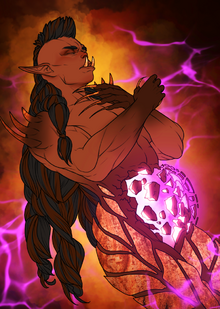
|
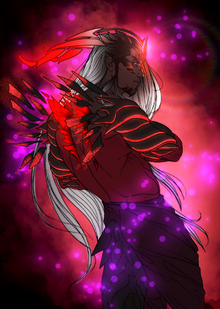
|
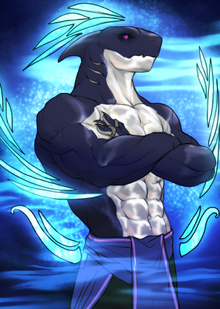
|
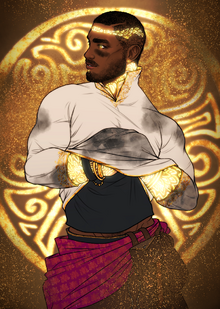
|
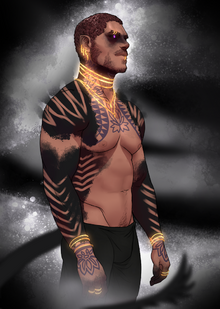
|

|

|

|
Magic Policy
Magic, or more specifically how to treat Magic (that is not Dragon Magic), varies for each of the Dragons, and subsequently as their faithful as they are bound to choose one of the Dragons as their Patron. The Dragon policies are called "The Radicals" for example the Radical of Destruction or the Radical of Apathy. Each Dragon has a context and nuance for why they feel that particular way, which is explained below. It is possible to apply multiple Radicals at once.
- Regulus, the Radical of Symbiosis: Regulus was born and lived most of his life as a mortal Ailor, and spent many years warming up to the presence of Occult. Notable in his history, is his intense friendship with a Pride Arkenborn, who softened him to the value of the Occult to fight an indeterminate "evil". As such, Regulus's Radical is that of Symbiosis, the idea that the Occult can also be recruited in the fight against the bad types of Magic, or the bad types of Magic users. Regulus fervently believes in the right of the Occult to live their life un-harassed by demands to convert to Dragon Magic or be rid of their Magic, as well as free from the fear of being killed for being Occult, but only for a narrow band of Occult who agree that casual, indifferent, or whimsical use of Magic is extremely dangerous. Regulus seeks to recruit Occult of Void, Exist, or Ordial alignment, who will aid in the fight against the Death Cults, Evolist Gods, Undead, Arken, and their ilk. Finally, Regulus and his followers determine those who are irredeemably "evil" for their vile Magic usage, declaring them Anathema and handing the matter off to Caius and his faithful for the hunt.
- Caius, the Radical of Fire: Caius has suffered for 80,000 years, as the Void itself is tearing him apart. When the Void opened, Dragons being curious, sent Caius in to try and understand what it was. This event caused Caius's soul and body to split in two (the other half being Ifrit). He has been infected with a slow rotting corruption from within that will eventually overtake him, and so the urgency of his fight against the Occult is a desperation to end the infection before it ends him. His Radical of Fire, insists that the bad type of infection (Magic, Afflicted) must be burned out with fire and sword without mercy. Umbra believes that Caius's condition is made worse by casual Magic usage (such as just doing magic for the sake of it, or to impress others without urgent need), and so while Caius does not demand all Magical people be exterminated for being Magical, he demands they be made to suffer for casual Magic and abuse of Magic for selfish reasons with fire so they learn not to add to the suffering of Caius. Caius and his followers also wait for Regulus to determine who is Anathema in the law of Draconism, and seek out to utterly destroy those that have been labeled irredeemable to help Caius in his suffering.
- Daiana, the Radical of Peace:
- Triton, the Radical of Power:
- Nox, the Radical of Illusion:
- Marik, the Radical of Illumination:
- Umbra, the Radical of Demise:
- Felicula, the Radical of Love:
- Severena, the Radical of Inward:
- Aurora, the Radical of Focus:
Priestly Activities
To be Expanded.
Trivia
To be Expanded.
| ||||||||||
| Accreditation | |||||||
|---|---|---|---|---|---|---|---|
|
| ||||||
